

What Use Are Economists? by Dani Rodrik. CAMBRIDGE – When the stakes are high, it is no surprise that battling political opponents use whatever support they can garner from economists and other researchers.

That is what happened when conservative American politicians and European Union officials latched on to the work of two Harvard professors – Carmen Reinhart and Kenneth Rogoff – to justify their support of fiscal austerity. Reinhart and Rogoff published a paper that appeared to show that public-debt levels above 90% of GDP significantly impede economic growth. Three economists from the University of Massachusetts at Amherst then did what academics are routinely supposed to do – replicate their colleagues’ work and subject it to criticism. Project Syndicate needs your help to provide readers everywhere equal access to the ideas and debates shaping their lives. Institute for New Economic Thinking (INET) Kay-john-state-of-economics-v11.
How should we teach economics? Economics and Ideology... Philip Pllkington: Purging Economics of Religion – A Rebuttal to Robert Nelson’s Defence of The Great Chain of Being. By Philip Pilkington, a writer and research assistant at Kingston University in London.

You can follow him on Twitter @pilkingtonphil Recently I stumbled upon what appeared to be an interesting book entitled “Economics as Religion: From Samuelson to Chicago and Beyond” by Robert Nelson, an economics professor at the University of Maryland. This is a vital and interesting topic. The (other) deleveraging: What economists need to know about the modern money creation process.
One of the financial system’s chief roles is to provide credit for worthy investments.
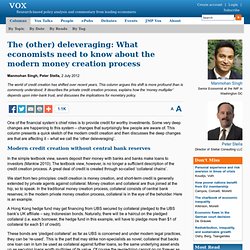
Some very deep changes are happening to this system – changes that surprisingly few people are aware of. This column presents a quick sketch of the modern credit creation and then discusses the deep changes are that are affecting it – what we call the ‘other deleveraging’. In the simple textbook view, savers deposit their money with banks and banks make loans to investors (Mankiw 2010). The textbook view, however, is no longer a sufficient description of the credit creation process. Philip Pilkington: The Degenerating Discourse of Mainstream Economics. By Philip Pilkington, a writer and research assistant at Kingston University in London.
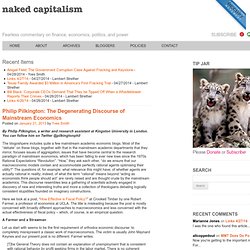
You can follow him on Twitter @pilkingtonphil The blogoshpere includes quite a few mainstream academic economic blogs. Most of the “debate” on these blogs, together with that in the mainstream academic departments that they mirror, focuses issues of aggregation; issues that have become central to the research paradigm of mainstream economics, which has been falling to ever new lows since the 1970s Rational Expectations “Revolution”. “How,” they ask each other, “do we ensure that our macroeconomic models contain and accommodate perfectly rational agents optimising their utility?” The questions of, for example: what relevance this might have; of whether agents are actually rational in reality; indeed, of what the term “rational” means beyond “acting as economists think people should act” are rarely raised and are thought crude by the mainstream academics. A Farmer and a Strawman 1. Philip Pilkington: Mistaking Men for Machines – How Neoclassical Economics Relies on Computer Science to Misunderstand Human Communication.
By Philip Pilkington, a writer and research assistant at Kingston University in London.
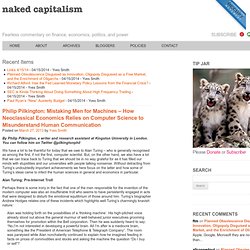
You can follow him on Twitter @pilkingtonphil We have a lot to be thankful for today that we owe to Alan Turing – who is generally recognised as among the first, if not the first, computer scientist. But, on the other hand, we also have a lot that we can trace back to Turing that we should be in no way grateful for as it has filled our minds with stupidities and our universities with people talking nonsense. Without detracting from Turing’s undoubtedly important achievements we here focus on the latter and how some of Turing’s ideas came to infect the human sciences in general and economics in particular. Getting Economics to Acknowledge Rentier Finance. The economics discipline has for the most part managed to ignore the 800 pound gorilla in the room: that of the role that the financial services industry has come to play.
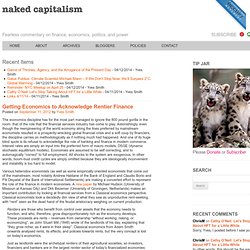
Astonishingly, even though the reengineering of the world economy along the lines preferred by mainstream economists resulted in a prosperity-wrecking global financial crisis and a soft coup by financiers, the discipline carries on methodologically as if nothing much had happened. And one of its huge blind spots is its refusal to acknowledge the role of banking and finance in modern commerce. Interest rates are simply an input into the preferred form of macro models, DSGE (dynamic stochastic equilibrium models).
Economies are assumed to be self correcting, and to automagically “correct” to full employment. All shocks to the system are exogenous. Rentiers are those who benefit from control over assets that the economy needs to function, and who, therefore, grow disproportionately rich as the economy develops. Economic Theory.
Galbraith_James_-_Keynote_speech. Getting Economics to Acknowledge Rentier Finance. Keen Debunking Economics Oxford 2011 Monbiot Seminar. Remarks at the Institute for New Economic Thinking Annual Plenary Conference in Berlin, Germany. April 12, 2012 Ever since the Crash of 2008 there has been a widespread recognition, both among economists and the general public, that economic theory has failed.
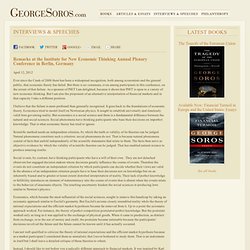
But there is no consensus, even among participants in this conference, on the extent of that failure. As a sponsor of INET I am delighted, because it shows that INET is open to a variety of new economic thinking. But I am also the proponent of an alternative interpretation of financial markets and in that capacity I take a different position. I believe that the failure is more profound than generally recognized.
Scientific method needs an independent criterion, by which the truth or validity of its theories can be judged. Social events, by contrast, have thinking participants who have a will of their own. Economics, which became the most influential of the social sciences, sought to remove this handicap by taking an axiomatic approach similar to Euclid’s geometry. Obviously, I did not discover reflexivity. Usually that works. DeLong Smackdown Watch: John Emerson Edition. John Emerson: Brad DeLong: Luke Lea Gets It Wrong, I Think: Assessing John Cochrane's "Can't I Let Sleeping Dogs Lie?
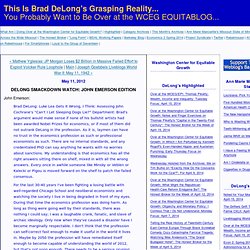
" Department: Brad's argument would make sense if none of his bullshit artists had been awarded Nobel Prizes for economics, or if most of them did not outrank DeLong in the profession. As it is, laymen can have no trust in the economics profession as such or professional economists as such. There are no internal standards, and any credentialed PhD can say anything he wants with no worries about sanctions. Occupy Economics. Occupy Wall Street has thrown off many sparks.

A little one landed in academic economics. Occupy the Classroom? - Dani Rodrik. Exit from comment view mode.
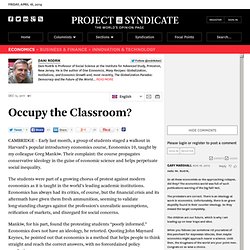
Click to hide this space CAMBRIDGE – Early last month, a group of students staged a walkout in Harvard’s popular introductory economics course, Economics 10, taught by my colleague Greg Mankiw. Their complaint: the course propagates conservative ideology in the guise of economic science and helps perpetuate social inequality. The students were part of a growing chorus of protest against modern economics as it is taught in the world’s leading academic institutions.
Economics has always had its critics, of course, but the financial crisis and its aftermath have given them fresh ammunition, seeming to validate long-standing charges against the profession’s unrealistic assumptions, reification of markets, and disregard for social concerns. Mankiw, for his part, found the protesting students “poorly informed.” Consider the global financial crisis. Adjusted Monetary Base Less Excess Bank Reserves.
On the Systemic failures of mainstream academic economics.